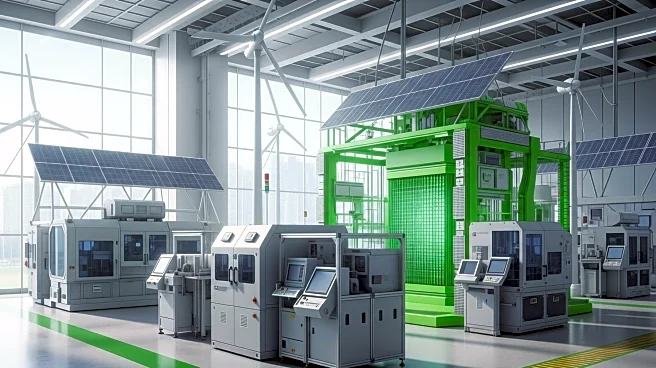What's Happening?
The semiconductor industry is undergoing a significant transformation as major players like Intel and Taiwan Semiconductor Manufacturing Company (TSMC) adopt sustainable manufacturing practices. This shift is driven by the increasing demand for advanced semiconductors to support artificial intelligence (AI) technologies, which have a substantial environmental impact. Companies are implementing strategies to reduce greenhouse gas emissions, integrate renewable energy, and optimize water usage. Intel aims for net-zero emissions by 2040, while TSMC targets 100% renewable energy by 2050. These initiatives are not only environmentally driven but also respond to regulatory pressures and consumer demand for eco-friendly products.
Why It's Important?
The move towards sustainable semiconductor manufacturing is crucial for mitigating the environmental impact of AI technologies, which require significant computational power and resources. By adopting green practices, companies can reduce their ecological footprint, enhance brand reputation, and appeal to environmentally conscious consumers and investors. This shift also aligns with broader environmental movements and regulatory demands, ensuring long-term resilience and competitiveness in the tech industry. As AI continues to grow, the demand for energy-efficient chips will increase, making sustainable manufacturing practices essential for future innovation and supply chain stability.
What's Next?
In the coming years, semiconductor companies are expected to accelerate the integration of renewable energy sources and adopt advanced water recycling technologies. Collaboration between chipmakers and designers will focus on developing energy-efficient architectures. Long-term goals include achieving net-zero emissions and exploring new sustainable materials like organic semiconductors. These efforts will be supported by initiatives like the U.S. CHIPS for America Act, which invests in local, energy-efficient semiconductor production. The industry will continue to face challenges such as high energy consumption and e-waste management, but AI-powered solutions may help optimize manufacturing processes and reduce environmental impact.
Beyond the Headlines
The green revolution in semiconductor manufacturing has broader implications for AI development and global environmental goals. Sustainable practices address the ecological burden of AI, which could otherwise undermine its societal benefits. The focus on circular economy principles and resource security enhances supply chain resilience against geopolitical risks. AI itself is becoming a tool for green manufacturing, optimizing designs and processes. This dual role of AI as both a burden and a solution highlights the need for sustainable practices to ensure technological progress does not come at an unsustainable environmental cost.









